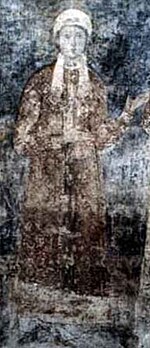Anastasia of Kiev
| Anastasia of Kiev | |||||
|---|---|---|---|---|---|
 |
|||||
| Queen consort of Hungary | |||||
| Tenure | 1046–1060 | ||||
| Coronation | 1046 | ||||
| Successor | Adelaide/Rixa of Poland | ||||
| Born | c. 1023 | ||||
| Died | 1074/1096 [aged ~51/73] Admont Abbey, Styria |
||||
| Burial | Admont Abbey, Styria | ||||
| Spouse | Andrew I of Hungary | ||||
| Issue |
Adelaide, Duchess of Bohemia Solomon David |
||||
|
|||||
| Dynasty |
Rurik (by birth) Árpád (by marriage) |
||||
| Father | Yaroslav the Wise | ||||
| Mother | Ingegerd Olofsdotter of Sweden | ||||
| Full name | |
|---|---|
| Anastasia Yaroslavovna |
Anastasia of Kiev (c. 1023 – 1074/1096) was Queen of Hungary as the wife of King Andrew the White. She was the eldest daughter of Grand Prince Yaroslav I the Wise of Kiev and Ingigerd of Sweden, and the older sister of Anne of Kiev, Queen consort of Henry I of France.
Around 1039, Anastasia married to Duke Andrew of Hungary, who had settled down in Kiev after his father Vazul took part in a failed assassination attempt aimed at King Stephen I of Hungary.
In 1046, her husband returned to Hungary and ascended the throne as King Andrew I after defeating King Peter I. Anastasia followed her husband to the kingdom. It was probably she who persuaded her husband to set up a lavra in Tihany for hermits who had come to Hungary from the Kievan Rus'. The royal couple did not have a son until 1053, when Anastasia gave birth to Solomon. However, Solomon's birth and later coronation caused a bitter conflict between King Andrew I and his younger brother Duke Béla, who had been the heir to the throne until the child's birth.
When Duke Béla rose in open rebellion against King Andrew in 1060, the king sent his wife and children to the court of Adalbert, Margrave of Austria. King Andrew was defeated and died shortly afterwards, and his brother was crowned King of Hungary on 6 December 1060.
...
Wikipedia
